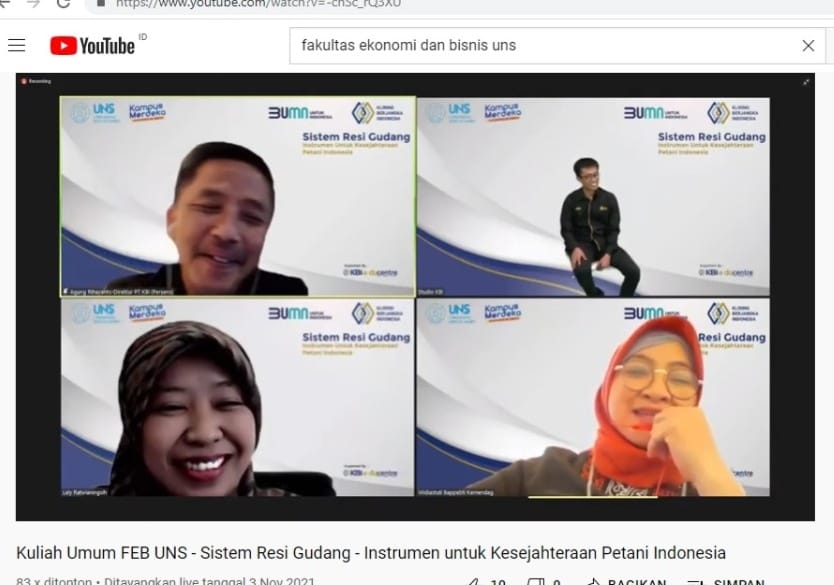
In collaboration with PT Kliring Berjangka Indonesia, FEB UNS Holds General Lecture on Warehouse Receipt System: Instrument in Promoting Indonesian Farmers Welfare
Almost half of the population of Indonesia works in the agricultural sector. However, until now, the agricultural sector has not shown a significant contribution to national income. Various problems and challenges continuously arise in the field, such as funding or capital source.
The establishment of a Warehouse Receipt System (WRS) from PT Kliring Berjangka Indonesia is expected to bring beneficial outcomes, including controlled and stable commodity prices, as well as working capital assurance.
The breakthroughs initiated by PT Kliring Berjangka Indonesia are expected to help farmers and farmer groups as well as small and medium enterprises experiencing difficulties in getting access to capital, especially through credit loans. This statement was delivered by Prof. Djoko Suhardjanto, M.Com (Hons), Ph.D., Ak, the Dean of the Faculty of Economics and Business (FEB) Universitas Sebelas Maret (UNS), through his remarks at the General Lecture on Warehouse Receipt Systems, Instruments for Promoting Indonesian Farmers Welfare. The general lecture was organized by FEB UNS in collaboration with PT Clearing Indonesia Futures on Wednesday, 3 November 2021.
“This general lecture aims to disseminate and to introduce students to a new insight on warehouse receipt system, which is expected to open a discourse for students discussion; hence, they can have a real contribution to economic development in Indonesia,” Prof. Djoko wishes.
Agung Rihayanto, Director of PT Kliring Berjangka Indonesia, reveals that PT. Kliring Berjangka Indonesia’s role, as a warehouse receipt registration center, is not only to assist farmers but also to be a safe mechanism for managers to use, especially in terms of the supply chain aspect. The warehouse has the following characteristics: beneficial in maintaining quality, value, and quantity, which allow farmers to accommodate quantity shrinkage and loss according to the designated policy. Hopefully, this public lecture will be a good start for students, especially for the FEB UNS faculty member, to learn more about the warehouse receipt system.
Meanwhile, Widiastuti, the Head of Bureau for the Development and Supervision of Warehouse Receipt System and Commodity Auction Market, Commodity Futures Trading Regulatory Agency (Bappebti), states that through Law No. 9 of 2006 concerning Warehouse Receipt System, which has been amended by Law No. 9 of 2011, Indonesia has financial and trading instruments that provide options for farmers, small and medium enterprises and other business actors to obtain funding from financial institutions with warehouse receipts as collateral.
According to her, this strategy repositions agricultural commodities as items with economic value that deserves to be used as collateral to get financing from financial institutions without any other guarantees, such as fixed assets, land, houses, and others. Therefore, farmers can use their commodities stored in WRS warehouses as collateral.
“This instrument development becomes the government’s commitment to empowering our farmers who are lacking in bargaining power and have limited options other than selling their crops during harvest period at low or unfeasible prices,” he said.
It should be emphasized that the warehouse receipt system has a role more than just financing but also stabilizing the price of agricultural products, breaking the extensive supply chain for agricultural product trade, and setting necessary quality standards.
Through this warehouse receipt system, the need for affordable, high-quality food commodities at the community level can be fulfilled while increasing profits at the farmer level at the same time.
With the information system in the warehouse receipt system, the availability of commodity supply reserves distribution data will be accurate and valid. Based on these data, the government can take appropriate policies regarding the distribution, regional grain provision to create national food sovereignty. WRS as stock management can be the tool to maintain food stability in Indonesia. (Humas FEB)
